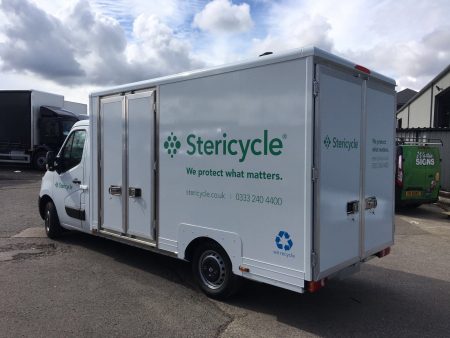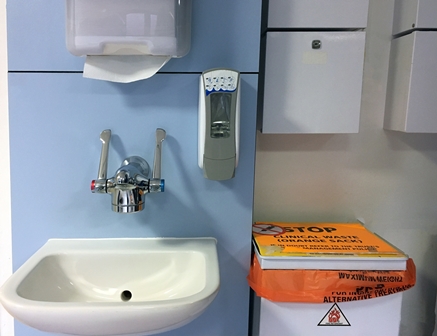A case against NHS England for allegedly accepting an “abnormally low” offer as part of a contract for clinical waste disposal services in a case brought by SRCL has been dismissed in a High Court judgment.
NHS England (NHSE) was also cleared of any wrongdoing on how costs of the contract were calculated.

SRCL (now Stericycle) had accused NHS England of accepting an “abnormally low” bid from another service provider
The case was brought by healthcare waste and compliance service provider, SRCL against the National Health Service Commissioning Board (also known as NHS England). It was heard in the High Court on days in June 2018 with a final ruling on 27 July 2018.
Reaction and appeal
After the hearing and judgment (which are summarised below) NHSE told letsrecycle.com that the case highlighted a “striking example of taxpayers being asked to pay over the odds for a much needed service”.
A spokesperson for SRCL said the company has “reviewed the court’s judgment and intends to appeal”.
SRCL (Stericycle)
The case concerns a tender process in 2017 which included SRCL, now known as Stericycle (in December 2017 SRCL announced that it was adopting the name Stericycle in the UK, the name of its global parent company). Stericycle describes itself as the UK’s “leading healthcare waste services provider”.
Complaint
SRCL said in its complaint issued in June 2017 that NHSE acted in breach of the Public Contracts Regulations 2015 when it failed to require the winning bidder, Healthcare Environmental Services (HES), to “explain the prices proposed in its winning bid”, and that if it had, then it would have had to be rejected under EU law for public tenders.
If NHSE had done so, according to the complaint, the contract would have been awarded to SRCL as both of the two lowest bids wouldn’t have met the obligations set out.
SRCL also said had NHSE price-checked the winning bid, it would have prevented HES and the second highest bidder from “fulfilling its commitments made in the quality section of the tender evaluation”.
NHSE explained to the court that while it accepts that these are the issues at hand, it refutes them and also conducted an internal investigation which found no wrong-doing.
Auction process

The contract was split geographically with the Cumbria area at the centre of this case (picture: Shutterstock)
The auction process for the contract in questions began in April 2017. The nationwide contract was split into six ‘waves’ based geographically, which according to court documents “was for NHSE to obtain lower prices through more effective competition”.
According to the ruling, the contract auction was held online for all waves, with companies bidding the lowest possible amount they would charge for the service and the lowest company would win the contract. This method is called an e-auction and was introduced for these contracts to achieve the “lowest possible price”.
SRCL, according to the court documents, had won “some of the other lots in waves 1-5” but complained about the process in wave 6, which covers GPs and pharmacies in Cumbria and the North East of England.
In the auction for Wave 6, according to the court documents, the final bid by HES was £310,000. The next lowest bidder was £313,000, from Sharpsmart. SRCL submitted only one bid early in the auction, of £479,999, and then stopped bidding.
Profit margins
The judge in the case, The Honourable Mr Justice Fraser, explained when delivering his verdict that during the process he heard evidence from Ms Lindsay Dransfield, the Commercial Director of SRCL, who managed the bid team for SRCL and oversaw the preparation for SRCL’s participation in this auction.
“Bluntly, she and SRCL felt that the figures were too low for it to be beneficial to SRCL’s business in the long term,” the verdict read.

Scotland-based Healthcare Environmental Services won the bidding with a £310,000 offer for ‘Wave 6’ of the contract
It continued: “The auction process was certainly resulting in contract awards which were nowhere near the gross profit margins that SRCL had previously enjoyed in its dealings with NHSE.”
During proceedings, Ms Dransfield presented an SRCL document produced in disclosure called the “Margin Calculation Model”.
This showed the pre-Framework revenues and profits being achieved by SRCL on the contracts from NHSE where it was the incumbent provider. For the region that covers the North of England, Region A, the gross profit being achieved by SRCL was 52%.
The national average gross profit margin being achieved by SRCL across the UK from NHSE was 49%.
The figures showed that NHSE paid total revenues to SRCL of £4.336 million. In money terms, gross profit to SRCL out of these revenues paid by NHSE was £2.24 million. The costs of the service to SRCL was £2.096 million
“Ms Dransfield obviously knew these figures and this had driven SRCL’s opposition to approach adopted by NHSE of achieving lower prices through the e auctions,” Mr Justice Fraser added.
He added: “These levels of gross profit appear very high. They are far, far higher than the ones SRCL found it could achieve on the contracts in which it was the winning (as in the lowest) bidder in the e auctions.”
The judge went on to say that Ms Dransfield failed to answer if the new e-auction process was the best way for NHSE to get the lowest price.
“I asked Ms Dransfield if there was an alternative method to achieving the lowest price amongst all four framework bidders, and if so, could she say what that was. ‘The lowest price’ was obviously the point of the question, and not “a lower price” which was how she constantly interpreted the question that she wished to answer.”
SRCL has sought to have this information taken out of the case, but it was refused by the judge.
Pyrolysis
Another aspect of the case was the use of a Pyrolysis plant for the disposal of the hazardous waste.

The contract was for the collection and treatment of hazardous waste at NHS GP surgery and pharmacies in Cumbria (picture: Shutterstock)
Garry Pettigrew, managing director of Scottish Healthcare Environmental, explained that the company owns a pyrolysis plant in Scotland, explaining that is the only one in the country to deal with hazardous waste.
The court documents say that SRCL had sought to run an argument in closing submissions that pyrolysis is not a permissible way for HES to dispose of hazardous clinical waste under the Framework Agreement in any event.
The company submitted that “pyrolysis is not approved by the Environment Agency as a means of disposing of incineration-only clinical waste.”
SRCL submitted that the Framework Agreement ITT required that “The supplier will ensure that wastes pertinent to this contract are treated in accordance with methodologies that are authorised by the Environment Agency” and because the plant was in Scotland, and used pyrolysis, this meant that HES was not treating the clinical waste in the required way.
However, this was thrown out by the judge saying that the company provided no evidence to support its claim, and also that “simply in terms of scientific analysis, pyrolysis and combustion are both methods of achieving extremely high temperatures.”
Rates
SRCL, when attempting to prove that the bid was unlawfully low, focused on some isolated rates at the pyrolysis plant for particular items, and compared them to the rates which either SRCL had used, or the rates which SRCL said HES should itself have used.
The judge criticised this approach and said the HES bid did add up as it owns the plant itself.

Mr Justice Fraser handed down his ruling at the high court of justice, business and property courts of England and Wales on Friday (July 27)
“HES has access to a pyrolysis plant in Scotland for incineration. This currently has a capacity of 8 tonnes per day. Scotland is rather closer to Cumbria and the North of England than other parts of England such as Kent. The commercial rate charged by SRCL to other companies who wish to use SRCL’s older technology incineration plant is £500 or £600 per tonne,” the judge explained.
He added: “Despite the geographical advantage to HES of utilising its own capacity at its own plant advantageously located for the Wave 6 works, SRCL persisted in an approach that insisted HES could only properly price its incineration needs (and hence the total in the representative basket) using the gate rate charged by SRCL.
“This is simply not logical, and ignores obvious business principles. HES has this plant available already; it is not necessary to pay another entity (SRCL or anyone else) to incinerate its own waste. Further, transport costs (which are inevitably bound into the rate) are far lower, particularly if efficient collection and transport methods are used, when waste is being collected in the North of England and taken to Scotland.”
Verdict
The judge then cleared NHSE of any wrongdoing, as well as rejecting requests to keep aspects of the trial confidential.
“The tender bid by HES which won the auction was not abnormally low, and any further explanation by HES would have further demonstrated that. Even if it were, NHSE would not have been required to reject the bid as a matter of law,” the judge concluded.
Simon Stevens, chief executive of NHS England, said in a statement to letsrecycle.com that the “common sense judgment” is welcomed.
“The NHS has to be a wise steward of taxpayers’ money, and sometimes that means taking on vested interests,” he explained.
Mr Stevens added: “This case was a striking example where taxpayers were being asked to pay over the odds for a much needed service in order the fill the coffers of a private company. So we welcome the common sense judgement by the courts in favour of the NHS.”
Related links:
Text of court hearing and judgment: http://www.bailii.org/ew/cases/EWHC/TCC/2018/1985.html
The post SRCL fails in tender case against NHS England appeared first on letsrecycle.com.
Source: letsrecycle.com General


